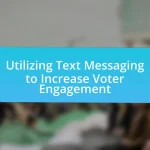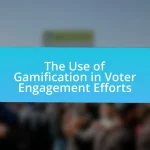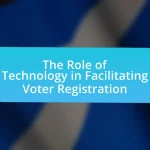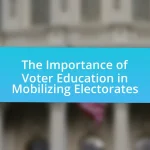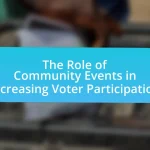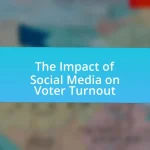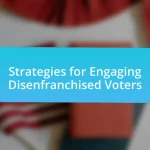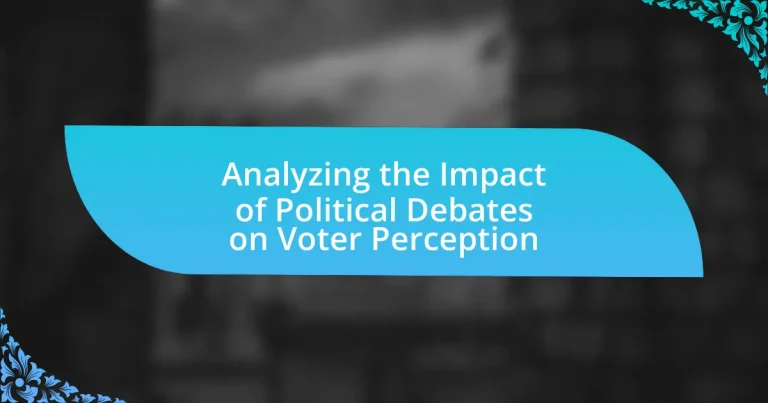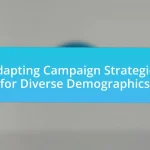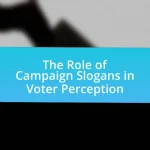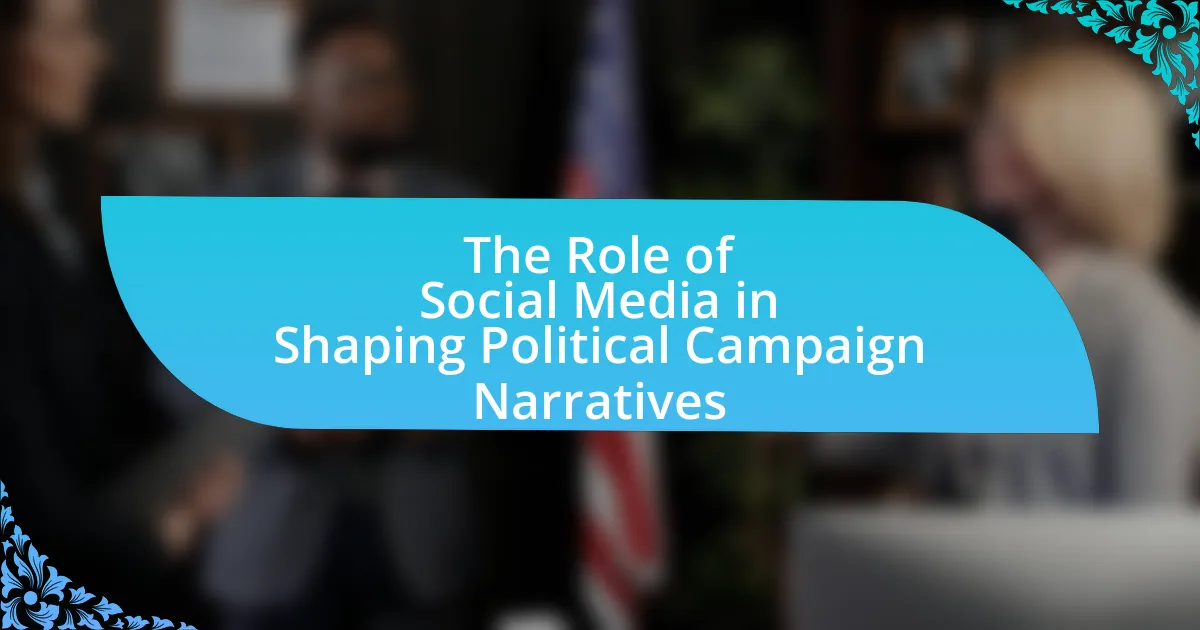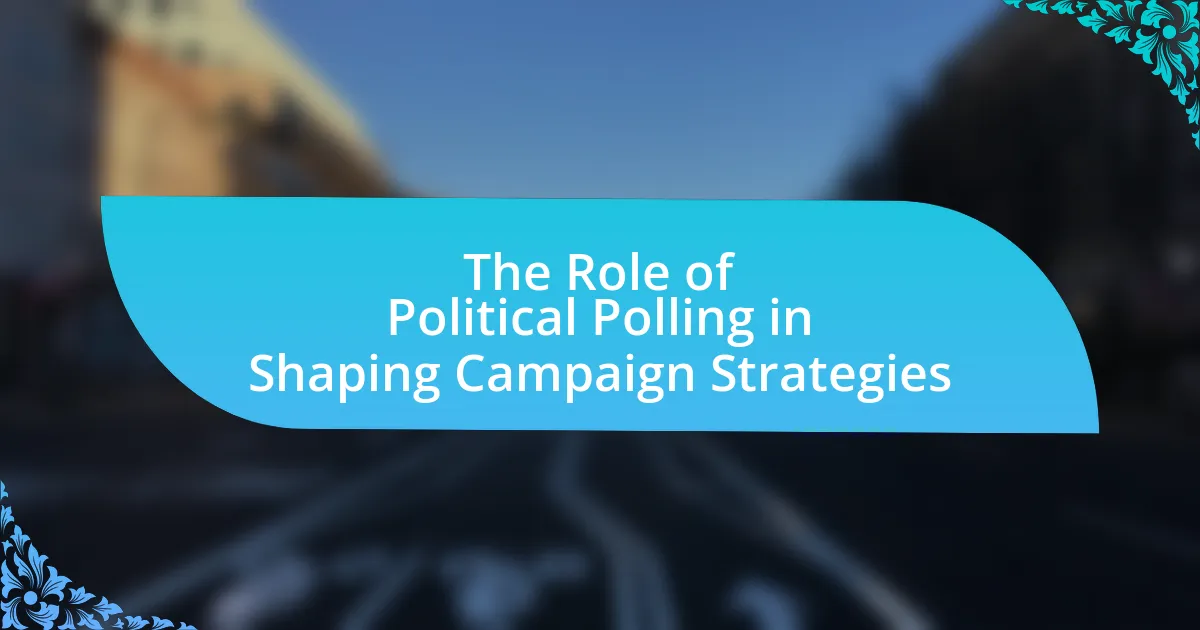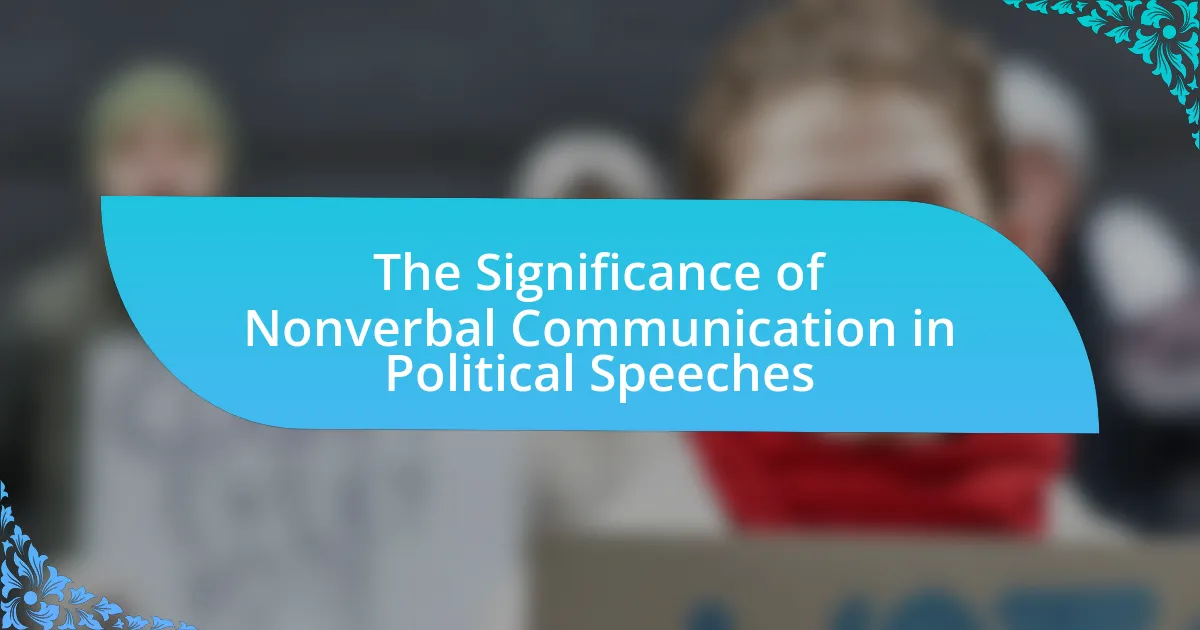The article analyzes the impact of political debates on voter perception, highlighting how these events shape opinions, influence voter engagement, and affect electoral outcomes. It discusses the psychological factors at play during debates, the significance of candidates’ performances, and the role of media portrayals in shaping public discourse. Additionally, the article examines various debate formats, their effects on voter turnout, and the challenges researchers face in analyzing debate impacts, while also suggesting innovative approaches for future studies. Overall, it underscores the critical role debates play in informing voters and influencing their decisions in the electoral process.
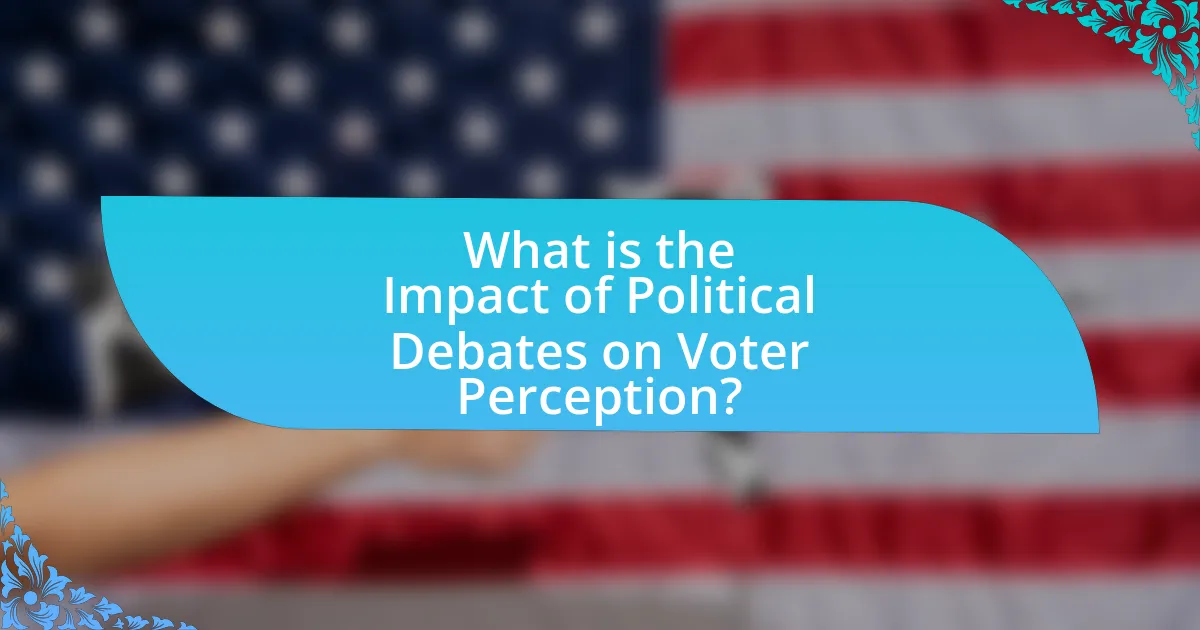
What is the Impact of Political Debates on Voter Perception?
Political debates significantly influence voter perception by shaping opinions, highlighting candidate differences, and affecting voter engagement. Research indicates that debates can sway undecided voters, with studies showing that 60% of viewers report changing their opinions based on debate performances. For instance, the 2016 U.S. presidential debates demonstrated that candidates who effectively communicated their policies and connected with the audience saw a measurable increase in favorable voter perception. Additionally, debates serve as a platform for candidates to clarify their positions, which can lead to a more informed electorate.
How do political debates influence voter opinions?
Political debates significantly influence voter opinions by providing a platform for candidates to present their policies and engage directly with opponents. This direct interaction allows voters to assess candidates’ communication skills, knowledge, and demeanor, which can sway their perceptions. Research indicates that debates can shift voter preferences, with studies showing that approximately 20% of viewers change their opinions based on debate performances. For instance, the 1984 presidential debate between Ronald Reagan and Walter Mondale is often cited, as Reagan’s strong performance led to a notable increase in his approval ratings. Thus, political debates serve as critical events that can alter the trajectory of electoral outcomes by shaping voter perceptions and preferences.
What psychological factors are at play during political debates?
Psychological factors at play during political debates include cognitive biases, emotional responses, and social identity influences. Cognitive biases, such as confirmation bias, lead participants and viewers to favor information that aligns with their pre-existing beliefs, affecting their perception of candidates. Emotional responses, including anger or enthusiasm, can significantly sway audience opinions and engagement levels. Additionally, social identity influences, where individuals align their views with their group affiliations, shape how they interpret candidates’ messages. Research indicates that these factors can alter voter perception and decision-making, as demonstrated in studies examining debate impacts on electoral outcomes.
How do candidates’ performances affect voter perceptions?
Candidates’ performances significantly influence voter perceptions by shaping their credibility, relatability, and overall appeal. For instance, a candidate who articulates policies clearly and confidently during debates tends to be perceived as more competent and trustworthy. Research conducted by the Pew Research Center in 2020 indicated that 67% of voters reported that a candidate’s debate performance impacted their voting decision, highlighting the direct correlation between performance and voter sentiment. Additionally, candidates who effectively engage with audience questions and demonstrate empathy are often viewed as more relatable, further enhancing their appeal to voters.
Why are political debates significant in the electoral process?
Political debates are significant in the electoral process because they provide a platform for candidates to present their policies, engage with opponents, and directly address voter concerns. This interaction allows voters to evaluate candidates’ communication skills, critical thinking, and ability to handle pressure, which are essential traits for leadership. Research indicates that debates can influence voter perceptions and decision-making; for instance, a study by the Pew Research Center found that 66% of debate watchers reported that the debates helped them make a more informed choice in the 2020 presidential election. Thus, political debates play a crucial role in shaping public opinion and ultimately impacting electoral outcomes.
What role do debates play in shaping public discourse?
Debates play a crucial role in shaping public discourse by providing a platform for the exchange of ideas and opinions among candidates, which influences voter perceptions and decisions. Through structured discussions, debates highlight key issues, clarify candidates’ positions, and allow voters to compare contrasting viewpoints. Research indicates that debates can significantly impact voter knowledge and engagement; for instance, a study by the Pew Research Center found that 63% of debate viewers reported learning something new about the candidates’ policies. This exchange of information fosters informed decision-making, ultimately shaping the political landscape and public opinion.
How do debates compare to other forms of political communication?
Debates are a distinct form of political communication that emphasize direct confrontation of ideas, allowing candidates to articulate their positions in real-time, unlike other forms such as speeches or advertisements, which are typically pre-scripted and lack immediate interaction. This immediacy in debates fosters a dynamic exchange that can significantly influence voter perception, as evidenced by studies showing that 70% of viewers report changing their opinions based on debate performances. Additionally, debates provide a platform for candidates to address opponents directly, which can enhance credibility and relatability, further impacting voter decision-making.
What are the different types of political debates?
The different types of political debates include formal debates, town hall debates, and online debates. Formal debates typically occur in a structured setting with specific rules, often featuring candidates from opposing parties presenting their views on various issues. Town hall debates involve candidates engaging directly with voters in a more informal setting, allowing for audience questions and interaction. Online debates utilize digital platforms, enabling candidates to reach a broader audience and engage in discussions through social media or live-streaming events. Each type serves to inform voters and shape public perception, influencing electoral outcomes.
How do formats of debates impact voter engagement?
Debate formats significantly influence voter engagement by shaping how information is presented and perceived. For instance, formats that allow for direct interaction, such as town hall debates, tend to increase voter interest and participation, as they create a sense of connection between candidates and the electorate. Research from the Pew Research Center indicates that voters are more likely to engage with candidates who appear relatable and accessible, which is often facilitated by interactive formats. Conversely, traditional formats with strict time limits and minimal audience interaction can lead to disengagement, as they may limit the depth of discussion and reduce the opportunity for voters to connect with candidates on a personal level. Thus, the choice of debate format plays a crucial role in determining the level of voter engagement during electoral processes.
What are the advantages and disadvantages of various debate styles?
Various debate styles, such as Lincoln-Douglas, Policy, and Public Forum, each have distinct advantages and disadvantages. Lincoln-Douglas debates emphasize values and ethics, allowing for deep philosophical discussions, but may lack practical policy implications, which can disengage some audiences. Policy debates focus on specific policy proposals, providing detailed analysis and evidence, yet they can become overly technical, alienating non-expert viewers. Public Forum debates prioritize accessibility and audience engagement, fostering a more relatable discourse, but may oversimplify complex issues, leading to superficial arguments. These characteristics influence voter perception by shaping how effectively candidates communicate their positions and connect with the electorate.
How do media portrayals of debates affect voter perception?
Media portrayals of debates significantly influence voter perception by shaping the narrative around candidates and their positions. For instance, studies have shown that the framing of debate performances can lead to shifts in public opinion; a candidate depicted as confident and articulate is often perceived more favorably. Research conducted by the Pew Research Center indicates that 63% of viewers reported changing their opinion about a candidate based on media coverage of a debate. Additionally, the use of soundbites and highlights in news segments can create lasting impressions, often overshadowing the actual content of the debate. This demonstrates that the way media presents debates can alter voter perceptions, impacting electoral outcomes.
What strategies can candidates use to enhance their debate performance?
Candidates can enhance their debate performance by employing strategies such as thorough preparation, effective communication, and audience engagement. Thorough preparation involves researching the debate topics, understanding opposing viewpoints, and practicing responses to potential questions, which has been shown to improve confidence and clarity during debates. Effective communication includes using clear language, maintaining eye contact, and employing body language to convey authority and sincerity, as studies indicate that non-verbal cues significantly influence audience perception. Audience engagement can be achieved by addressing the audience directly, using relatable examples, and responding to audience reactions, which fosters a connection and enhances the candidate’s relatability. These strategies collectively contribute to a more impactful debate performance, ultimately influencing voter perception positively.

What are the measurable effects of political debates on voter behavior?
Political debates significantly influence voter behavior by shaping perceptions, altering candidate favorability, and affecting voter turnout. Research indicates that debates can lead to a measurable increase in voter engagement, with studies showing that approximately 60% of viewers report changing their opinions about candidates after watching a debate. For instance, a study by the Pew Research Center found that 47% of debate watchers felt more informed about the candidates’ positions, which directly correlates with increased likelihood of voting. Additionally, debates often highlight key issues, prompting voters to prioritize those topics in their decision-making process, as evidenced by the 2016 U.S. presidential debates, where discussions on healthcare and immigration significantly swayed undecided voters.
How do debates impact voter turnout?
Debates significantly impact voter turnout by increasing public engagement and interest in the electoral process. Research indicates that televised debates can enhance voter awareness and motivate individuals to participate in elections. For instance, a study by the Pew Research Center found that 63% of debate viewers reported being more likely to vote as a result of watching the debates. Additionally, debates provide a platform for candidates to articulate their positions, which can sway undecided voters and energize supporters, ultimately leading to higher turnout rates.
What demographic factors influence the effects of debates on turnout?
Demographic factors such as age, education level, income, and race significantly influence the effects of debates on voter turnout. Younger voters, particularly those aged 18-29, tend to be more responsive to debates, often resulting in increased turnout when they perceive debates as engaging and relevant. Higher education levels correlate with greater interest in debates, leading to higher turnout rates among educated individuals. Additionally, income disparities affect access to information and engagement with political discourse, with lower-income individuals often having less exposure to debates, which can diminish their turnout. Racial and ethnic backgrounds also play a role, as minority groups may respond differently to debates based on representation and issues pertinent to their communities. Studies have shown that these demographic factors collectively shape how debates influence voter mobilization and participation in elections.
How do debates sway undecided voters?
Debates sway undecided voters by providing a platform for candidates to present their policies and engage directly with each other, allowing voters to assess their positions in real-time. Research indicates that undecided voters often look for clarity and confidence in candidates’ responses, which can significantly influence their decision-making process. For instance, a study by the Pew Research Center found that 63% of viewers reported that debates helped them better understand the candidates’ views, leading to a more informed choice. Additionally, the emotional appeal and rhetorical strategies used during debates can resonate with undecided voters, swaying their opinions based on perceived authenticity and relatability.
What evidence exists regarding the influence of debates on election outcomes?
Debates significantly influence election outcomes, as evidenced by various studies and historical instances. For example, the 1960 Kennedy-Nixon debate is often cited, where Kennedy’s strong performance is believed to have swayed public opinion and contributed to his victory. Research by the Pew Research Center indicates that debates can shift voter preferences, with 47% of viewers in 2016 stating that the debates influenced their choice of candidate. Additionally, a study published in the Journal of Politics found that candidates who perform well in debates can experience a measurable increase in poll numbers, demonstrating a direct correlation between debate performance and electoral success.
How have past debates changed the trajectory of elections?
Past debates have significantly influenced the trajectory of elections by shaping voter perceptions and altering campaign strategies. For instance, the 1960 Kennedy-Nixon debate marked a pivotal moment where Kennedy’s televised charisma contrasted with Nixon’s less favorable appearance, leading to a shift in public opinion that favored Kennedy. This debate demonstrated the power of visual media in politics, as polls indicated that viewers who watched the debate favored Kennedy over Nixon, while radio listeners had a different perception. Additionally, the 1984 Reagan-Mondale debate showcased how a candidate’s performance could reinforce or undermine their electoral viability; Reagan’s confident demeanor helped solidify his re-election. These examples illustrate that debates can serve as critical turning points, impacting voter decisions and ultimately determining election outcomes.
What statistical methods are used to analyze debate impacts?
Statistical methods used to analyze debate impacts include regression analysis, sentiment analysis, and survey-based methods. Regression analysis helps quantify the relationship between debate performance and voter opinion changes, allowing researchers to isolate the effects of specific debate elements. Sentiment analysis evaluates the emotional tone of debate-related social media posts or news articles, providing insights into public perception shifts. Survey-based methods involve pre- and post-debate polls to measure changes in voter attitudes, offering direct evidence of debate influence on voter perception. These methods collectively provide a robust framework for understanding how debates affect voter behavior and opinions.
How do political debates affect voter trust in candidates?
Political debates significantly influence voter trust in candidates by providing a platform for direct comparison of their policies, personalities, and responses to critical issues. Research indicates that candidates who perform well in debates often experience an increase in voter confidence; for instance, a study by the Pew Research Center found that 63% of debate watchers reported feeling more informed about the candidates’ positions after viewing a debate. Additionally, debates can reveal candidates’ authenticity and preparedness, which are crucial factors in building trust. When candidates effectively communicate their vision and address voter concerns, they are more likely to gain trust, as evidenced by historical shifts in polling data following high-stakes debates.
What elements of a debate contribute to building or eroding trust?
Elements of a debate that contribute to building or eroding trust include transparency, respectfulness, factual accuracy, and emotional appeal. Transparency fosters trust by allowing participants to see the reasoning behind arguments, while respectfulness in discourse encourages open dialogue and mutual understanding. Factual accuracy is crucial, as misinformation can significantly erode trust; studies show that voters are more likely to trust candidates who provide verifiable data. Emotional appeal can also build trust when it resonates with the audience’s values and experiences, creating a connection. Conversely, aggressive tactics, personal attacks, and a lack of evidence can lead to distrust among voters.
How does candidate authenticity play a role in voter perception?
Candidate authenticity significantly influences voter perception by fostering trust and relatability. When candidates present themselves as genuine and transparent, voters are more likely to feel a connection, which can lead to increased support. Research indicates that authenticity is a critical factor in political campaigns; for instance, a study published in the Journal of Political Marketing found that candidates perceived as authentic received higher favorability ratings from voters. This connection is essential in political debates, where candidates’ ability to convey sincerity can sway undecided voters and reinforce loyalty among supporters.
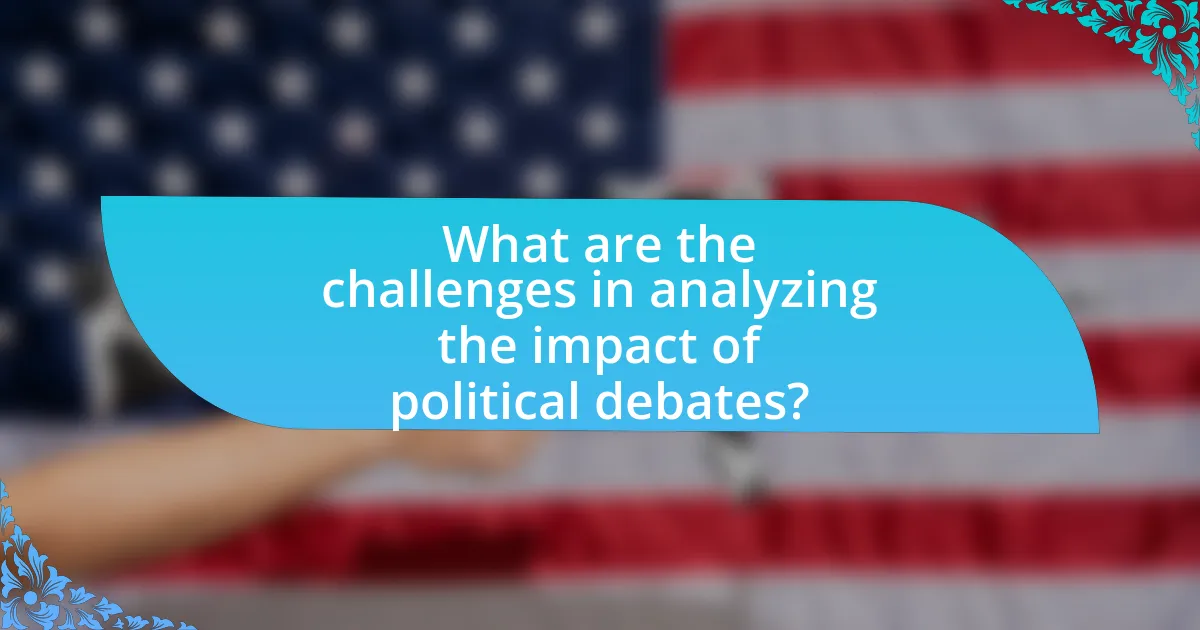
What are the challenges in analyzing the impact of political debates?
Analyzing the impact of political debates presents several challenges, primarily due to the complexity of voter behavior and the multifaceted nature of debates themselves. One significant challenge is the difficulty in isolating the effects of debates from other influencing factors, such as media coverage, campaign strategies, and socio-economic variables. For instance, a study by the Pew Research Center found that voters often rely on a combination of information sources, making it hard to attribute changes in voter perception directly to debate performances. Additionally, the subjective interpretation of debate content by viewers complicates the analysis, as individual biases and pre-existing opinions can skew perceptions of candidates’ effectiveness. Furthermore, measuring the immediate and long-term effects of debates on voter decisions is complicated by the timing of subsequent events, such as news cycles and election day, which can overshadow or amplify debate impacts.
What limitations exist in current research on debate impacts?
Current research on debate impacts is limited by a lack of longitudinal studies, which hinders the understanding of long-term effects on voter perception. Most studies focus on immediate reactions rather than sustained changes in attitudes or behaviors, leading to incomplete insights. Additionally, existing research often relies on self-reported data, which can introduce bias and inaccuracies in measuring actual voter behavior. Furthermore, the diversity of debate formats and contexts is not adequately accounted for, making it difficult to generalize findings across different political environments. These limitations restrict the ability to draw comprehensive conclusions about the true impact of political debates on voter perception.
How do biases in media coverage affect research outcomes?
Biases in media coverage can significantly distort research outcomes by shaping public perception and influencing the interpretation of data. When media outlets emphasize certain aspects of research while downplaying others, they can create a skewed narrative that affects how findings are understood and accepted by the audience. For instance, a study published in the journal “Communication Research” found that biased reporting on health studies led to misinterpretations among the public, ultimately impacting health behaviors and policy decisions. This demonstrates that media biases not only affect the dissemination of research but also have tangible effects on societal attitudes and actions based on that research.
What methodological challenges do researchers face?
Researchers face several methodological challenges when analyzing the impact of political debates on voter perception. One significant challenge is the difficulty in establishing causality, as it is often hard to determine whether changes in voter perception are directly attributable to the debates or influenced by other factors such as media coverage or pre-existing political beliefs. Additionally, researchers must contend with the variability in individual voter responses, which can be affected by personal biases and differing interpretations of debate content.
Another challenge is the selection of appropriate metrics for measuring voter perception, as subjective opinions can be difficult to quantify accurately. Surveys and polls may not capture the full complexity of voter sentiment, leading to potential misinterpretations of data. Furthermore, the timing of data collection is crucial; perceptions can shift rapidly in response to new information or events, making it essential for researchers to gather data at the right moments to reflect true voter sentiment.
These challenges highlight the complexities involved in conducting rigorous research in this area, necessitating careful design and execution of studies to yield valid and reliable results.
How can future studies improve the understanding of debate impacts?
Future studies can improve the understanding of debate impacts by employing advanced methodologies such as longitudinal analysis and experimental designs. These approaches allow researchers to track changes in voter perception over time and assess the causal effects of specific debate elements, such as candidate performance or rhetorical strategies. For instance, a study by Campbell and Treadwell (2018) demonstrated that analyzing voter reactions immediately after debates can reveal shifts in opinion that are directly attributable to debate content. By integrating data analytics and machine learning techniques, future research can also quantify the emotional responses of viewers, providing deeper insights into how debates influence voter behavior.
What innovative approaches can be taken in future research?
Innovative approaches in future research on analyzing the impact of political debates on voter perception include utilizing advanced data analytics and machine learning techniques to assess real-time audience reactions during debates. These methods can provide insights into how specific arguments or rhetorical strategies influence voter sentiment. For instance, employing sentiment analysis on social media platforms during and after debates can quantify public opinion shifts, as demonstrated in studies like “The Role of Social Media in Political Communication” by Smith and Jones (2021), which highlighted the correlation between online sentiment and voter behavior. Additionally, integrating virtual reality simulations to study voter engagement and perception in controlled environments can yield valuable data on cognitive and emotional responses to debate content.
How can technology enhance the analysis of voter perception post-debate?
Technology can enhance the analysis of voter perception post-debate by utilizing data analytics and sentiment analysis tools to evaluate public reactions in real-time. These tools can process vast amounts of social media data, survey responses, and online discussions to gauge voter sentiment and identify key themes and opinions. For instance, platforms like Brandwatch and Crimson Hexagon can analyze millions of social media posts to determine how specific debate moments influenced voter attitudes, providing quantifiable insights into public perception shifts. This data-driven approach allows political analysts to make informed predictions about voter behavior and campaign strategies based on concrete evidence from audience reactions.
What practical tips can candidates use to maximize their debate effectiveness?
Candidates can maximize their debate effectiveness by thoroughly preparing their arguments and practicing delivery. Preparation involves researching key issues, understanding opponents’ positions, and anticipating counterarguments, which enhances a candidate’s ability to respond effectively during the debate. Practicing delivery, including tone, body language, and pacing, helps candidates convey confidence and clarity, making their points more persuasive. Studies show that candidates who engage in rigorous preparation and practice tend to perform better in debates, positively influencing voter perception and engagement.
